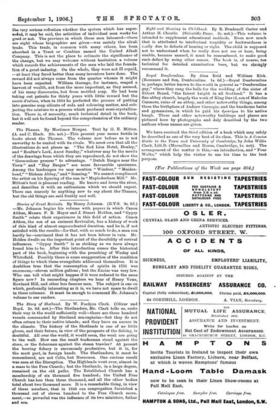The Story of Shetland. By W. Fordyce Clark. (Oliver and
Boyd. 2s. 6d. net.)—The Shetlanders, Mr. Clark tells us, make their way in the world sufficiently well—there are three hundred vessels commanded by Shetland sea-captains—but they do not often return to their native islands; and they have an excuse in the climate. The history of the Shetlands is one of no little gloom, and their future, in view of the prospects of the fishing, is doubtful. All over the world, it would seem, the weak are going to the wall. How can the small tradesman stand against the store, or the fisherman against the steam trawler? At present the herring fishery is enormously productive, but it is, for the most part, in foreign hands. The Shetlanders, it must be remembered, are not Celts, but Norsemen. One curious result was seen at the Disruption. The Highlands went over, almost in a mass to the Free Church ; but the Shetlands, in a large degree, remained on the old paths. The Established Church has a membership of six thousand five hundred; the United Free Church has less than three thousand, and all the other bodies total about two thousand more. It is a remarkable thing, in view of these numbers, that in 1843 one congregation furnished a thousand out of eleven hundred to the Free Church move- ment—so powerful was the influence of its two ministers, father and son.


































 Previous page
Previous page